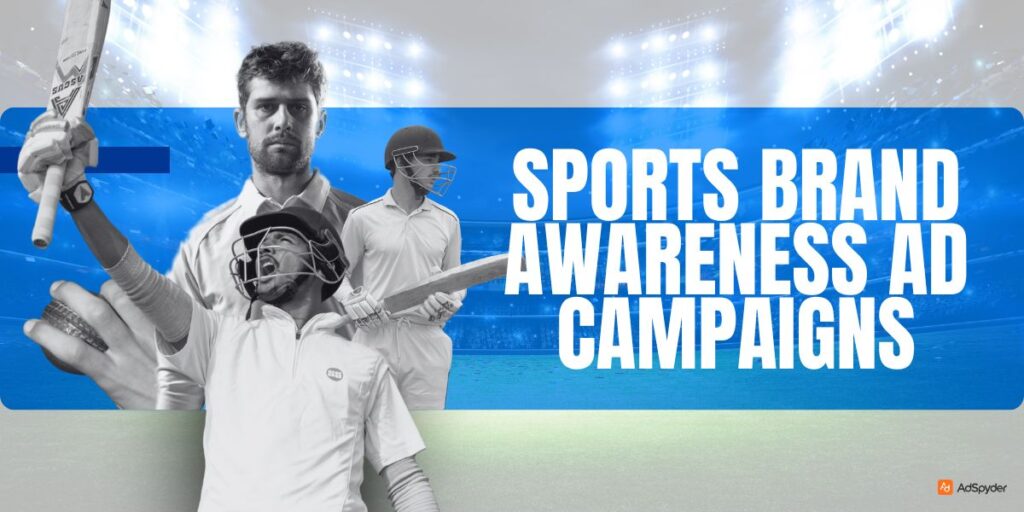Sports are a fast-paced industry; thus, brand awareness is essential. Building a strong brand presence is crucial for drawing clients, encouraging loyalty, and increasing sales, regardless of whether you own a small athletic goods business or a multinational sportswear conglomerate. In order to engage with your target audience and shape brand perception, effective advertising is just as important as performance and quality. This in-depth manual will delve into the realm of Sports Brand Awareness Ad Campaigns, giving you the tools to develop campaigns that appeal to sports fans and propel your company to success.
Ready to Elevate your Marketing Strategy?
Why Brand Awareness Matters for Sports Brands
Community, passion, and emotion are what drive the sports industry’s expansion. In order to leverage these factors and establish significant relationships with your target audience, brand recognition is crucial. This is the reason it’s so crucial:
- Increasing Recognition: In a congested market, brand recognition helps your business stand out and makes it simple for clients to recognise you. Campaigns that are memorable, have consistent messaging, and have a strong logo aid in a company’s recognition.
- Creating a Positive Image: Campaigns to raise brand recognition can influence how people view your company by communicating your mission, beliefs, and distinctive qualities. In the sports sector, athleticism, performance, and lifestyle, which is especially important, are often connected to brand image.
- Driving Customer Loyalty: Customers are more likely to stick with you if they know more about your brand and think well of it. Brand awareness encourages connection and trust, which results in advocacy and repeat business.
- Attracting New Customers: Effective brand awareness campaigns can introduce your business to new markets and attract potential customers people might not be familiar with your goods or services.
- Growing Market Share: Possessing a strong brand presence can help you obtain a competitive edge and grow your market share. It is more likely that consumers will choose a reputable and well-known brand.
- Supporting Revenue and Sales: Ultimately, increased brand recognition leads to more sales and money. Your odds of a customer making a purchase are increased if they are aware of your brand and think well of it.
- Building Brand Equity: Brand recognition, or the perceived value and strength of your brand, is the cornerstone of brand equity. You can charge more, enter new areas, and withstand economic downturns when your brand is strong.
Understanding Your Target Audience
Clearly defining your target demographic is essential before starting any brand awareness campaign. Which sports fans are you attempting to connect with? Take into account the following elements:
- Demographics: Age, sex, place of residence, earnings, level of education, etc.
- Sports Interests: What are their favourite sports? Is it sports, sports, or both that they support? Do they participate in any specific sports or pastimes?
- Lifestyle: How do they live? Are they outdoorsy and active? Do they watch leagues for professional sports? What additional hobbies do they have?
- Values: Which values hold significance for them? Do they place a higher importance on innovation, sustainability, community, or performance?
- Media Consumption: Where do they obtain their sports-related information? Do they listen to podcasts, social media accounts, or websites that provide sports news?
You can customise your brand awareness initiatives to appeal to particular target audience segments by developing thorough audience personas.
Related – Facebook Ads for Outdoor Gear
Key Channels for Sports Brand Awareness
A number of platforms are very helpful for building relationships with sports fans and increasing brand recognition:
- Social media networks (Twitter, Facebook, Instagram, and TikTok): These platforms are essential for engaging with sports fans, sharing engaging content, starting targeted marketing initiatives, and building a brand community.
- Influencer Marketing: Collaborating with athletes, fitness influencers, or sports figures can expand your audience and establish your authority.
- Content marketing (articles, videos, and blogs): Your target audience may be drawn in and kept interested by producing informative material about sports, fitness, and healthy living.
- Partnerships and Sponsorships: Endorsing athletes, sports teams, or events can raise brand recognition and associate your business with noble principles.
- Traditional Advertising (TV, Radio, Print): For reaching particular demographics, traditional advertising channels can still be successful, even though digital marketing is essential.
- Media Outreach and Public Relations: Creating favourable press coverage can aid in increasing credibility and brand awareness.
- Experiential Marketing (Events, Activations): Putting together engaging events and experiences may attract clients and help them develop a relationship with your business that lasts.
- Email Marketing: You may send tailored communications about events, discounts, and new products by compiling an email list of sports fans.
- Website and E-commerce Platform: Your brand’s online residence is your website. Make sure it is aesthetically pleasing, user-friendly, and conversion-optimised.
Crafting Compelling Sports Brand Awareness Ad Campaigns
Your target audience should be drawn in by your brand awareness initiatives, which should also communicate your brand values and leave a lasting impression.
- Tell a Story: Using stories to emotionally connect with your audience is a strong technique. Share your experiences with athletes, conquering obstacles, or your love of sports.
- Emphasis on Emotion: Harness the feelings of enthusiasm, motivation, tenacity, and friendship that are connected to athletics.
- Emphasise Your Brand principles: Whether your brand is about performance, innovation, sustainability, or community, make sure to express these principles in a clear and concise manner.
- Employ Strong Visuals: Attention-grabbing photos and videos are crucial for delivering your brand’s message.
- Make Remarkable Slogans and Taglines: A catchy slogan or tagline can convey the spirit of your business and increase brand recall.
- Engage Your Audience: Request comments and participation from your intended audience. Answer messages and comments, and provide conversation starters.
- Hold Giveaways and Contests: These events can stimulate interest in and interaction with your brand.
Leveraging Digital Marketing for Brand Awareness
In today’s online-driven world, brand visibility is primarily driven by digital marketing.
- Social Media Marketing: Share engaging content, conduct focused advertising campaigns, interact with fans, and create a brand community on social media channels. Engage in sports-related discussions and use pertinent hashtags.
- Influencer Marketing: Collaborate with pertinent influencers to expand your audience and establish your authority. Choose influencers whose beliefs and style naturally align with both your target audience and brand identity.
- Content Marketing: Provide insightful information that appeals to your target audience and establishes your company as a thought leader in the sports sector, such as blog entries, articles, videos, and infographics.
- Search Engine Optimisation (SEO): Make sure your brand shows up in search results when prospective buyers are seeking sports-related goods or information by optimising your website and content for pertinent keywords.
- Paid Advertising: Conduct focused advertising campaigns on search engines, social media, and other online platforms to connect with the individuals you wish to reach. To attract those who have already interacted with your brand to do so again, employ retargeting.
- Email Marketing: Send out newsletters on a regular basis with information about events, promotions, new items, and brand stories, and cultivate an email list.
- Website Optimisation: On mobile devices, make sure your website is easy to use, visually appealing, and responsive. Highlight your principles, brand narrative, and range of products.
Sponsorships and Partnerships for Brand Elevation
By supporting athletes, sports teams, or events, you can improve brand recognition and associate your business with positive values.
- Choose the Right Sponsorship: Pick sponsorships that complement your target market and brand values.
- Turn on Your Sponsorship: Put more than simply your logo on a banner. Make fan-connecting activations and experiences that are engaging.
- Leverage Social Media: Utilise social media to promote your partnerships and interact with fans.
- Measure the Impact: Analyse how your sponsorships affect sales and brand recognition.
Measuring Success and ROI
In order to determine your return on investment and make wise choices regarding your future marketing initiatives, it is essential to measure the effectiveness of your sports brand awareness campaigns.
- Key Performance Indicators (KPIs): Determine which important indicators support the objectives of your campaign. For sports brand awareness efforts, some typical KPIs are as follows:
- Impressions and Reach: Monitor the number of people who saw your ads or other marketing materials.
- Website Traffic: Track how many people are visiting your website, especially on important sections like your blog, product pages, and about us area.
- Social Media Engagement: Look out for the likes, shares, comments, and other engagements that take place on your social media posts. Monitor followers’ growth.
- Brand Mentions: Monitor the frequency with which your brand is mentioned online, especially on social media, blogs, and review sites.
- Brand Sentiment: Examine the general emotion and tone of internet discussions regarding your company.
- Website Conversions: Monitoring how many people visit your website and complete the actions you ask them to complete, such as buying something, downloading a resource, or signing up for a newsletter.
- Customer Surveys: Survey consumers to learn more about their perceptions and awareness of your brand.
- Media Mentions: Count how many times your brand appears in print, radio, television, and online media.
- Share of Voice: Examine your brand’s sound to other companies in the sports industry.
- Google Analytics: Track site traffic, user behaviour, and conversion rates by utilising Google Analytics insights. Monitor conversions and create goals to determine the effectiveness of your marketing.
- Social Media Analytics: Utilise the analytics tools that social media sites offer to monitor important metrics like reach and engagement.
- Brand Monitoring Tools: To keep tabs on internet discussions and brand references, use brand monitoring tools.
- CRM Systems: Track customer interactions and gauge how your brand awareness campaigns affect consumer behaviour by integrating your marketing initiatives with your CRM system.
Best Practices for Sports Brand Awareness Ads
- Develop a Strong Brand Identity: Clearly state the mission, values, and distinctive selling propositions of your brand. What distinguishes your brand from the others?
- Know Your Target Audience: Recognise the characteristics, passions, and driving forces of your ideal clients.
- Create High-Quality Content: Display your athletes, products, and brand narrative with expertly taken images and films.
- Tell Your Story: Tell the tale of your company, its origins, and how it relates to sports.
- Be Consistent: Make sure the graphical design and brand messaging are the same across every medium of marketing.
- Interact with Your Audience: Respond to messages and comments from your social media followers.
- Watch Your Online Reputation: Respond to online reviews and handle any client concerns.
- Monitor Your Outcomes: Keep an eye on your KPIs and make any marketing adjustments.
- Keep Up: Stay updated on the most recent developments in social media and sports marketing.
Common Mistakes to Avoid in Sports Brand Awareness Ad Campaigns
- Lack of a Clear Brand Identity: Not defining the mission, values, and distinctive selling propositions of your brand.
- Ignoring Your Target Audience: Ignoring the characteristics, passions, and driving forces of your ideal clients.
- Poor Quality Content: Using videos and low-resolution images that don’t properly represent your brand.
- Inconsistent Messaging: By applying a variety of marketing platforms to convey various brand messages.
- Neglecting Social Media Engagement: Failing to communicate with your fans and reply to messages and comments.
- Online Reviews Ignoring: Online reviews is failing to monitor and respond to online reviews.
- Not Tracking Results: Failing to keep an eye on your KPIs and modify your campaigns as necessary.
Check Out – Mastering Retargeting Ads for Sports Product Buyers
The Future of Sports Brand Awareness Ad Campaigns
Changing consumer behaviour and developing technologies will influence sports brand visibility in the future. Important trends to keep an eye on include:
- Personalised Marketing: Personalising offerings and marketing messages for specific clients by using data.
- Augmented Reality (AR) and Virtual Reality (VR): Immersive events that let followers engage with your business in novel ways.
- Artificial Intelligence (AI): AI-driven solutions for enhancing advertising campaigns and customising consumer communications.
- Emphasis on Customer Experience: Developing enduring encounters that promote brand advocacy and word-of-mouth advertising.
Conclusion for Sports Brand Awareness Ad Campaigns
Sports brand awareness advertising is essential for establishing a strong brand presence, attracting new customers, and fostering long-term success. You can develop successful campaigns that connect with sports fans and propel your company to success by knowing your target demographic, producing engaging content, utilising digital marketing platforms, and monitoring your progress. Keep in mind that increasing brand recognition is a continuous effort. You may build a devoted clientele and position your company as a leader in the sports sector by keeping abreast of the most recent developments and regularly interacting with your audience.
FAQs
For sports brands, why is brand recognition crucial?
It enhances market share, boosts revenue, fosters a positive image, fosters customer loyalty, draws in new clients, and develops brand equity.
How can I determine who my sportswear target market is?
Take into account media consumption patterns, lifestyle, values, sports interests, and demography.
What media channels are most effective at promoting sports brands?
The following are some examples: social media, influencer marketing, content marketing, email marketing, PR, sponsorships, and website optimisation.
What qualities distinguish a successful sports brand awareness campaign?
Storytelling, establishing an emotional bond, emphasising brand values, strong imagery, catchy taglines, regularity, audience participation, and competitions.
How might the awareness of sports brands be aided by digital marketing?
Making use of website optimisation, influencer marketing, content marketing, social media marketing, email marketing, paid advertising, and SEO.
Why are sports brands interested in sponsorships?
They promote brand awareness, link the brand to admirable ideals, and open doors for fan interaction.
How can I assess whether sports brand awareness efforts are successful?
Monitor brand mentions, brand sentiment, website conversions, customer surveys, media mentions, share of voice, reach and impressions, websites, and social media activity.




